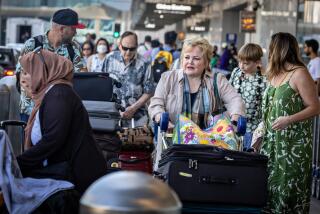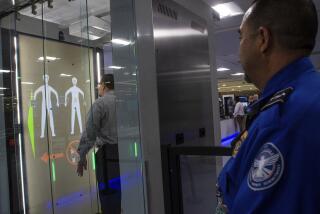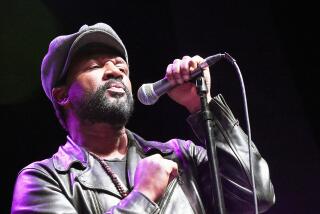Air Passenger Screening: Who Should Be Checked? And Why?
John Wayne Airport is getting a new federal security chief, but why anyone would want the job is beyond me. It sounds like a job that would send you to bed every night hoping a national disaster won’t strike on your watch. That kind of stress can’t be good for one’s long-term health.
The new director in Orange County, Ashley “Skip” Williams, becomes part of the country’s program to federalize airport security under the new Transportation Security Administration.
At or near the top of the agency’s to-do list is figuring out how to handle passenger screening. Should security forces check only people who appear to be of Middle Eastern lineage, as many have argued since the terrorist attacks of Sept. 11? Or, should they be more random, so as to parcel out the inconvenience to passengers and avoid charges of racial profiling?
As a 50ish blue-eyed blond who was pulled aside for screening last week at Reagan National Airport in Washington, I have fresh thoughts.
It was my first airplane trip since last summer. In a pre-Sept. 11 world, I would have been irritated at being electronically frisked. Not this time. I kibitzed with the screener, telling him I was “excited” about being selected. He took that in good humor and ran a detector over my clothing.
He got a beep from a small clasp in my sunglasses but let me keep them. He hand-checked the metal button on my jeans after he got a beep from it.
The security check was not even a minor inconvenience. On the scale of life’s hassles, it was a 1 out of 10. In fact, because I don’t like profiling of ethnic groups, I took satisfaction in being part of the group being screened.
Upon reflection, however, I had to confess that was only half the equation. That I was selectively checked doesn’t address whether people who more nearly match the profile of the Sept. 11 hijackers also would be targeted.
What I want to know is whether I would have been checked while three Middle Eastern men in their early 30s in front of me sailed through. Or, would each of the three have been checked too?
If the policy had been to check all three merely because they appear to be Middle Eastern, is that good or bad? If none had been checked, would that be good or bad? Three such men weren’t in line with me, so I’ll never know.
Many people probably will be offended that I even ask such a question. But not asking seems disingenuous.
The lament is that checking Middle Easterners amounts to unfair profiling. And common sense tells you that 99.9% of people who “look” Middle Eastern are law-abiding people, who would rightly be angered at being considered potential terrorists.
But I’d put an asterisk by the assumption that giving them special attention in airports amounts to racial profiling--akin to the complaints that black motorists are stopped at rates much greater than whites.
The difference is that black motorists have never threatened terrorist actions against the nation. Islamic fundamentalists posing as regular Joes have, in essence, declared such a war. That would seem to help define the “target” group.
It turns out, though, there is no such thing at the airport as a target group--at least not based on appearance. A spokeswoman at the Transportation Security Administration says passenger screening is determined both by random checks and by computers that digest lots of information about travelers, including such things as when a ticket was bought and whether a person is traveling alone.
The new agency doesn’t screen people based on ethnicity or other personal traits outlawed under federal anti-discrimination laws, spokeswoman Deirdre O’Sullivan says. The agency also believes that the random checks act as a deterrent to would-be hijackers, she says. Let’s hope so.
Now that my maiden post-Sept. 11 flight is under my belt, I have greater appreciation for the headaches facing airport security officials. The next time I complain about my job, I’ll ponder the one awaiting Mr. Williams at John Wayne Airport.
*
Dana Parsons’ column appears Wednesdays, Fridays and Sundays. Readers may reach Parsons by calling (714) 966-7821.
More to Read
Sign up for Essential California
The most important California stories and recommendations in your inbox every morning.
You may occasionally receive promotional content from the Los Angeles Times.










